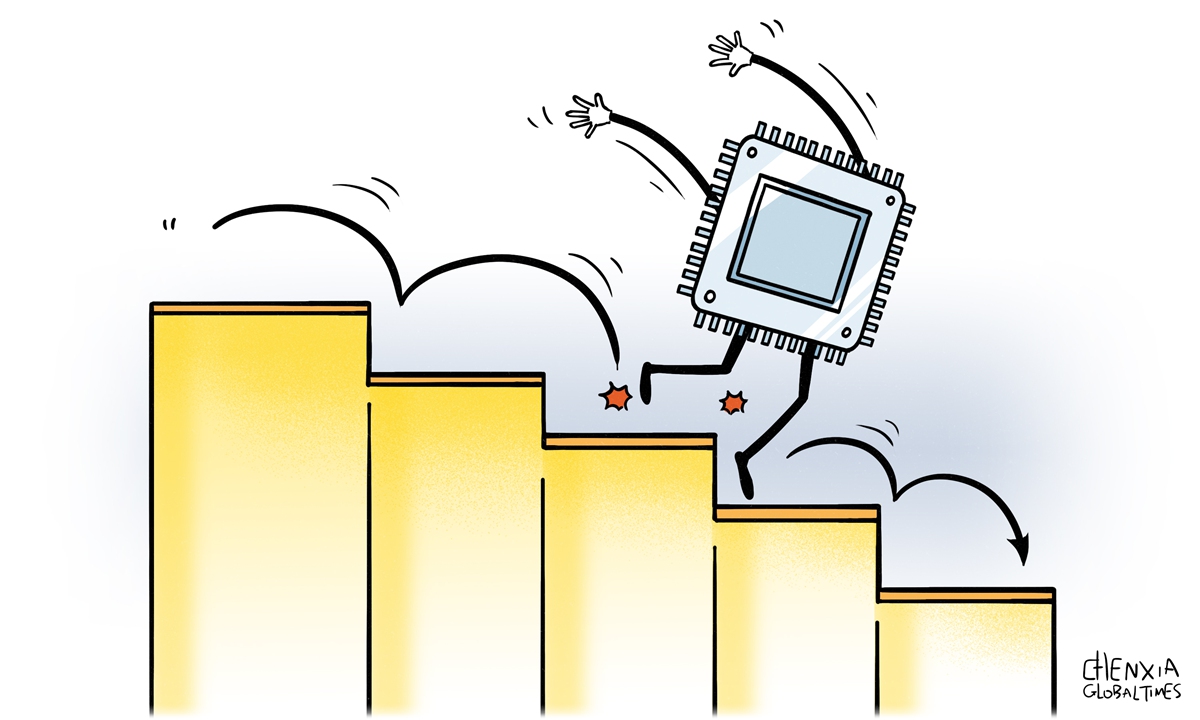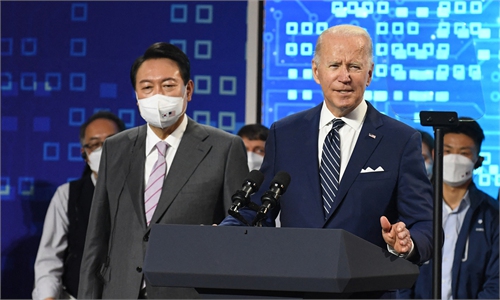
Illustration: Chen Xia/Global Times
Samsung, South Korea's largest company, said profits at its chip division plunged more than 90 percent to 270 billion won ($220 million) in the fourth quarter of 2022, according to media reports. Diving profits at the South Korean electronics giant's chip unit amid intensifying US disruptions to global supply chains are not surprising, but it is still worse than most industry analysts expected.The drastic fall of profits of Samsung's chip unit should serve as a warning to global semiconductor industry, and similar warnings have been given by an increasing number of semiconductor giants that are struggling with a historic slump in the price of memory chips which a Goldman Sachs analyst said will likely continue this year.
US memory maker Micron Technology has said it will cut spending for new plants and equipment as well as slash output, while Intel has announced layoff plans after reporting disastrous earnings and dismal earnings projections. Japan's Kioxia Holdings, which makes NAND flash chips, has said it was cutting output by 30 percent, while South Korean chipmaker SK Hynix has also scaled back investments and output.
The global chip industry, which is widely regarded as the most critical strategic industry at the heart of commercial and geopolitical competition among great powers, is suffering from serious semiconductor supply and demand imbalance and disorder due to a range of factors including the US' sweeping restrictions on chip exports to China, global economic gloom, and historic inflation in many economies. Among these, the US' relentless political interference to the sector is undisputedly the biggest source of uncertainty.
In addition to escalating exporting restrictions and crackdown on Chinese semiconductor companies, the US has been intensifying political coercion on its allies and semiconductor companies. While pushing the so-called Chip 4 alliance, the Biden administration is lobbying countries like Japan, South Korea and the Netherlands to side with the US to contain China's chip progress.
However, the small chip circle the US is attempting to build is based on a series of shaky geopolitical calculations. The fundamental motive of the US is to revitalize its domestic chip research and development and manufacturing, even at the expense of the interests of companies in allies. Its political interference which violates the laws of market operation has caused serious disruption to the global supply chain, harming the interests of semiconductor companies across the world. The difficult situation experienced by global semiconductor companies is the latest evidence.
The US' rhetoric fools nobody, instead, its protectionism and hegemony has caused unease in South Korea and other economies. The US' hegemonic practices such as contentious requests for chip data in late 2021 lay bare that the US will not hesitate to harm its allies' interests when necessary. Moreover, many countries are enjoying mutually beneficial trade and cooperation with China in the semiconductor field.
In face of the US' increasing pressure, the governments of various countries and semiconductor companies should take the message from their disappointing financial results: keeping pace with the US will hurt their own interests. They should resist the pressure of the US, follow the market trend, so as to minimize the damage.
The global semiconductor industry is expected to face a new round of reshuffle amid the reorganization of the global supply chain and the "decoupling" moves of the US in the post-COVID-19 recovery. As countries are increasing inputs to boost their semiconductor sector, it should be noted that the chip industry is an industry that requires a large amount of investment. Whether it is research and development of new technologies or the establishment of production bases, it cannot be driven by just relying on subsidies from the government. If a country's chip industry wants to develop, the most fundamental thing is to rely on the power of the market to ensure profits, so as to continuously attract commercial capital and establish a healthy ecology for the development of the chip industry.
For the US, it should immediately abandon the illusion of maintaining its chip hegemony by splitting chip manufacturing through the "decoupling" approach. Going on like this is tantamount to suffocating the development of the global chip industry, and will eventually be abandoned by the market.
The author is a reporter with the Global Times. bizopinion@globaltimes.com.cn



